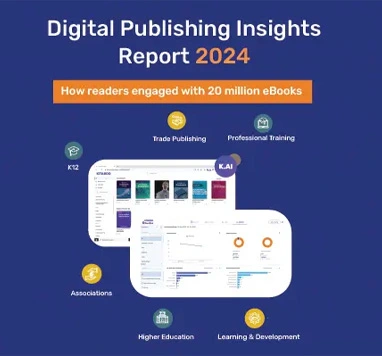
eBook Publishing Platform: The Blacks and The Whites
In this era of eBooks, there are countless digital publishing platforms that help educators create thoroughly engaging content online and distribute it easily to learners. The clear benefits of these platforms are reflected in solid numbers. Statistics show that the market size for eBook publishing platforms is projected to increase to $67.86 billion at a CAGR of 10.2% by 2027.
With that said, digital eBook publishing platforms are developing rapidly on the internet. It may not be as easy to find software that is reliable, high-quality, and safe to use at the same time. There are several disadvantages as well that come from selecting the wrong digital publishing platform for your purposes.
This is why today we will deep dive into the advantages and disadvantages of eBook publishing platforms to help you make an informed decision. Let’s dig deeper into that insight.
Table of Contents
I. Importance of eBook Publishing Platforms
II. Advantages of eBook Publishing Platforms
- Simplified and Streamlined Processes
- Post-Publishing Edits and Revisions
- Modernized Reading Experiences
- Ease of Distribution
- Supplemental Revenues
- Sustainability
- Scalability
- Accessibility, DE&I Compliance
III. Disadvantages of eBook Publishing Platforms
IV. KITABOO: The Right Balance and Features for eBook Publishing
Importance of eBook Publishing Platforms
Traditional content publishing involves taking the long route toward getting learning content on paper.
The author would compose the learning materials, have them vetted, verified, and endorsed by industry specialists, and then pitch them to publishers. This entire process takes a long time to complete, which is impractical in the fast-paced educational environment of today.
Digital publishing platforms allow educators to browse through an extensive repository of collected works, including interactive and engaging elements in their eBooks is a quicker way of mass-producing high-quality learning content.
The most important aspect of eBook publishing platforms is their capability to reduce the turnaround times required to create learning materials drastically.
Additionally, educators can enhance the learning content with modernized techniques like gamification and interactivity for better learning outcomes.
Advantages of eBook Publishing Platforms: The White
Digital eBook publishing platforms provide several unmistakable benefits to educators and educational institutions. The major advantages are as follows
1. Simplified and Streamlined Processes
As opposed to the traditional publishing methods, eBook publishing platforms provide a far easier and more streamlined approach to publishing.
Educators can use these platforms to create learning content using inherent tools and features and distribute them online directly via channels like email.
2. Post-Publishing Edits and Revisions
eBook publishing platforms come in extremely handy as they allow educators to make changes or publish updates to the learning content even after it has been published.
With robust eBook publishing platforms like KITABOO, a centralized console gives educators total control over the content in real-time.
3. Modernized Reading Experiences
eBook publishing platforms carry important modern features like interactive elements, animations, gamification of learning modules, etc., that enable educators to create engaging content.
Learning materials created using such elements resonate better with the modern learner who prefers personalizing their experiences while learning.
4. Ease of Distribution
eBook publishing platforms are a complete solution that empowers educators to create, publish, edit, evaluate, and distribute their learning materials freely.
The only true requirements for an effective, mass-scale distribution are a device with a screen and an internet connection.
5. Supplemental Revenues
Many eBook publishing platforms offer educators to create a supplemental stream of revenues by requesting ad space for the services of their business associates or of their own.
This helps generate more revenue for each unit of eBook sold or distributed.
6. Sustainability
eBooks are more environmentally sustainable than the paper-based hardcopies of the learning material.
The entire ecosystem of eBook publishing can be made even more sustainable by incorporating renewable energy to run computers that house the eBook publishing software.
7. Scalability
The digital revolution has made it possible to drastically expand the reach of education using the internet and computers/mobile phones.
eBook publishing platforms make it possible to scale eBook distribution to a global level by simply connecting to the internet and creating a community.
Disadvantages of eBook Publishing Platforms
Every coin has two sides. eBook publishing platforms do provide several stellar benefits to educators, but there are a few disadvantages that must be navigated first to realize the benefits.
1. Quality Control
With the increase in the requirement for interactive, animated, gamified, and diversity-inclusive modules in eBooks, there is an increased pressure to provide these services.
As such, it is difficult to select a platform that provides high-quality services for some features, say, for example, text-to-speech or animation. It is essential to perform thorough background checks and select only the best software for eBook publishing.
2. Restrictive Tooling
In an increased pressure of improving revenue streams through a widely oversimplified eBook publishing process, many platforms resort to restrictive tooling.
The free-use versions come with several useful features, but there are restrictions that reduce their usability. For example, making text-to-speech available for free but restricting the voice to one language.
3. Hidden Costs
In order to stay competitive, some eBook publishing platforms may hide several costs and display only prima facie pricing to attract buyers.
Hidden costs inevitably show up when educators try to use features of the platform, only to realize that there are additional costs associated with that kind of usage. It is imperative to have a detailed discussion with a representative of the platform to understand how pricing works thoroughly.
KITABOO: The Right Balance and Features for eBook Publishing
When it comes to selecting eBook publishing platforms, the right choice makes all the difference. KITABOO offers educators end-to-end control over their content, reinforced with modern encryption-based security measures.
KITABOO’s feature list includes key elements that educators seek today, like easy integrations, offline access, branded apps, content analysis, interactive content, animated and gamified content, and much more.
Educators can also digitize their current learning content using this platform and achieve stellar distribution efficiency with its expanded integrability.
Book a call with KITABOO today to understand the full scope and features of this versatile digital publishing platform.
Discover how a mobile-first training platform can help your organization.
Kitaboo is a cloud-based platform to create, deliver & track mobile-first interactive training content.





